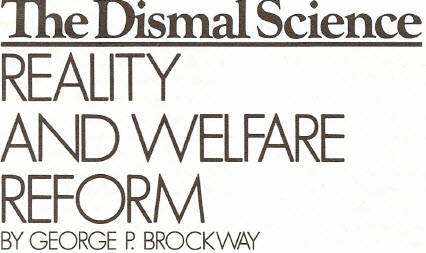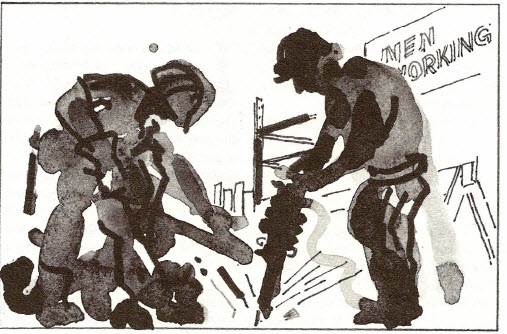By George P. Brockway, originally published November 28, 1988
THE GIVEAWAY of Senator Daniel Patrick Moynihan’s new Family Security Act -aka welfare reform – is its cost. I don’t mean that the cost is to be given away; I mean that the low cost betrays the modest ambitions of the bill.
The estimated expenditure is $3.34 billion over five years. That’s $668 million a year, which may seem like a lot of money to you, but works out to $20.62 – exactly twenty dollars and sixty-two cents – for every man, woman and child living in poverty in the United States of America.
Yes, I know that the plan isn’t intended to do anything about poverty, isn’t meant to help the working poor, isn’t supposed to shelter the homeless or nourish the ill-fed, has nothing to do with improving or expanding medical services. In fact, one of its charms for the radical Right is that it is expected to reduce expenditures for public housing, Food Stamps, Medicaid and Aid to Families with Dependent Children (AFDC). So let’s look at it this way: $668 million is 0.00015 – or 15 thousandths of 1 per cent-of the current GNP. Or this way: It’s about a third of the projected cost of the additional space shuttle they’re building.
I’m sorry, but I’ve overstated the case a bit, for the $3.34 billion includes a “workfare” provision that will cost $900 million. This is one feature of the bill insisted on by President Reagan and feverish-eyed Republicans like Senator Orrin G. Hatch of Utah. Everyone else, including more liberal (if they don’t mind my using the word) Republican governors who will have to administer it, apparently hopes to repeal the provision either because of its negative cost effectiveness or because of its meanness. If that $900 million is deducted from the total, we have $2.44 billion left, or $488 million a year for everything the bill promises to do. The summaries given the press naturally accent the positive. They emphasize that a real effort is going to be made to force fathers to share in the support of their offspring. No one (except the fathers) can object to that, especially since it may persuade some to stay home with their families and thus prove rewarding all around.
The summaries further emphasize education (not the same as workfare). You can’t object to that, either. We’ve heard about our illiteracy rate and our inability to do simple arithmetic and our ignorance of our government and of history. We know businessmen complain that they have to weary themselves with excessive interviews to find competent workers. And so on. It’s hard, therefore, to be against more education. It’s also hard to imagine that the puny budget will make much of a dent in the problem.
For my part, I become depressed when I hear vocational education touted as a panacea. We must train these people to be punctual, we are told, and to work diligently and not goof off. Does anyone suppose they don’t know all that? It’s no secret. They’ve heard it all before, but they haven’t seen much good come of it.
Few experiences can be more disillusioning and dispiriting than undergoing training for the kinds of jobs that don’t exist. Perhaps my long memory misleads me here, yet I recall the junior high school shop where I learned to solder Western Union splices and to thread separate black and white wires through clay pipes set in the joists and studs of a mocked-up house. I was astonished when, in the real world, I saw my first BX cable, and I remain skeptical of that sort of job training unless it is done on the job. I have had occasion to observe a couple of for-profit training schools in operation, too, and I really don’t think the answer is privatization.
The solution is jobs. We’ve seen the solution in action – but again my long memory probably misleads me, for hardly a man seems to be alive who remembers the famous days and years of the New Deal. Everyone else knows that the New Deal failed. It taxed and taxed, and spent and spent, and elected and elected, and still, in 1939, on the eve of World War II, the unemployment rate was 17.2 per cent.
As I have previously quoted Disraeli, there are lies, damned lies, and statistics; and I have yet to meet even a professor of economic history who is aware of how that 17.2 per cent lies. So I’ll tell you. It counts all the millions who worked for the CCC, NYA, WPA, and the rest of the so-called alphabet-soup agencies as unemployed. Now, the millions who worked for those agencies in fact worked and in fact produced goods for the common wealth, and were in fact paid for it. They built thousands of schools, libraries, post offices, hospitals, and dams; restored thousands of acres of forests; paved thousands of miles of highways and sidewalks; helped bring electricity to the farms; made a start on public housing; painted pictures; produced plays and concerts; published a set of state guidebooks that is still unequaled; and gave courses in every subject imaginable. If that was unemployment, we could stand a bit more of it. Nor would it be unbearable to have urban streets swept and suburban leaves raked.
Everyone knows, of course, that this was impossibly expensive and wasteful. Yes, the last budget of Herbert Hoover’s Presidency (fiscal year 1933) was only $2.8 billion in deficit. And what was the last prewar New Deal deficit? $3.1 billion; ten per cent larger. To be sure, $300 million was a lot more in those days than it is at present. But the point is that enabling millions of people to contribute to the common weal and to maintain their self-respect cost only 10 per cent more than doing nothing. Which approach was the really wasteful one? Moreover, our wartime experience demonstrates that the so-called First New Deal would have been a lot more successful if it had spent more, not less.
INSTEAD of the creative programs of the New Deal, the new scheme has its workfare, something Ronald Reagan wishes to be remembered for. He deserves to get his wish. The requirement is that by 1994, one parent in every two-parent family (an institution the bill is supposed to be encouraging) that receives benefits must be made to work at least 16 hours a week in what is grandly known as the Community Work Experience Program. What will they be paid for this work? Zero. Well, you know, beggars can’t be choosers.
Since this provision does not take effect until 1994, it is a fair guess that New York’s Democratic Senator Moynihan, among others, intends to try to repeal it after the Great Veto Threatener leaves the White House. This is a judgment call with which I beg to differ. It brings to mind Moynihan’s first attempt at welfare reform which came when he was Richard M. Nixon’s Domestic Affairs Adviser. The attempt was defeated by a combination of conservatives opposed to any form of welfare and liberals led by the late George Wiley of the National Welfare Rights Organization, who pointed out that the proposed benefits were lower than those then in effect.
I had the pleasure and privilege of knowing George Wiley, who was a wise and humorous and dedicated man. He was well aware of Voltaire‘s dictum that the best is the enemy of the good, and he understood perfectly the argument that the benefits could be improved once the law was in place. He simply doubted that the improvements would ever come. The record supports his judgment. Over the past several years, for example, AFDC payments have lost a good third of their value because of inflation. The Pentagon gets budget boosts on top of generous estimates of inflation, but I’ve not noticed any rush to rectify the AFDC situation. As for the workfare amendment, it has already, in this Democratic Senate, survived by a 41-54 vote an attempt to table (and so defeat) it.
Workfare should not be confused with what the sponsors of the Family Security Act consider its heart and sinews: JOBS (for Job Opportunities and Basic Skills. The republic would collapse without silly acronyms).The laudable aim of this program is to get people off the welfare rolls and into regular employment where they can be self-supporting and self-respecting. As I’ve said, I’m dubious about the training being offered. Anyway, after training the welfare recipients are supposed to get to work, and I don’t at all object to that. The regulations covering JOBS are moderately complicated, and some of them are not nice; but I want to talk about something more fundamental.
We are told that the unemployment rate has now fallen to 5.2 per cent. Everyone knows this figure is too low, but I’m not going to quarrel with it – at least not here and now. I’m merely going to note that currently received economic doctrine, taught in practically all colleges and universities in the land, and I am sure accepted as gospel by large majorities of both houses of Congress, holds that full employment actually means 6 per cent unemployment. If unemployment really falls any lower than that, the economy is expected to overheat, and we’ll have inflation. (I’m not aware that we have been without inflation since World War II, except for one year in President Harry S. Truman’s second term, and one year in President Dwight D. Eisenhower‘s; so let’s just say that we’ll have even more inflation.)
Indeed, the newspapers and the airways are full of ominous questions right now: Will the Federal Reserve Board raise the interest rate again to head inflation off at the pass? Will that send the stock market into a tizzy? Will it abort our slowly recovering foreign trade? Will it make it harder to reduce the deficit? Will it make the mortgage rate so high that home ownership becomes an impossible dream even for two-earner Yuppies? Anyone who believes that mainstream economists know what they’re talking about will answer all those questions in the affirmative.
Where does that leave us? It leaves us with a JOBS program that is a mirage or a hoax. Assuming we believe the unemployment figures, we already have too many people working for our own good. Even if the JOBS training program should succeed beyond all rational expectations, even if the trainees could then be successful in finding work that would not (one of the requirements) displace anyone already working, we would have to head them off at the pass. We couldn’t afford to have so few people unemployed.
I AM NOT making any of this up. If you have merely glanced at journalistic reports of the thoughts of our mainstream economists, you may think that when they talk about 6 per cent of the work force being unemployable, they are saying all those millions are too little educated, too stupid, too sick, or too pregnant. That’s not exactly what they mean. They do classify many people under those headings, but they mean something else as well. They are speaking of friction in the economy – that is, time lost while workers are between jobs. Again there’s misunderstanding (and some of the economists even misunderstand themselves), for they make it sound as though there are several million people out there whimsically flitting from job to welfare to another job for no good reason. No doubt some such free spirits exist, and they will always be good for Presidential anecdotes; but the real friction results from business coming and going. It’s known as free enterprise.
In 1987, something more than 60,000 corporations went bankrupt. Most of the bankruptcies were very small. Nevertheless, they totaled over $36 billion. That ain’t hay, and it accounts for a couple of million people thrown out of work.
Then there are all the “efficient” mergers, which are efficient because they fire people. There is all the seasonal unemployment – clerks and warehousemen let go after the Christmas rush, farm workers between seasons, people laid off in model changeovers. There are all the customers’ men dropped after a market crash, and all those who lose their jobs when business temporarily slows, and those whose jobs disappear when their companies relocate for tax reasons – or in search of cheaper labor.
The foregoing account for the 6 per cent friction in the economy. The friction is not the fault of the workers; it is the fault of the system and its ethics. And the system is not a fact of nature; it is our creation. We created it in the image of mainstream economics, and the result is not altogether pretty.
The thing about mainstream economics is that it starts with the price system as given. The price system is not simply what the stickers read in the supermarkets or how the bidding goes in the grain pit in Chicago. It includes all prices, interest rates, rents – the works – and particularly and especially wage and salary scales. Mainstream economics assumes that the way the rewards of the economy are distributed is none of its business.
Our present price system will be relatively stable so long as there are 6 per cent unemployed or underemployed. This is not quite like Marx’ industrial reserve army, because the important point is that these people must be drastically under rewarded, whether they work or not, and that the next 10-15 per cent above them can’t be treated much better (the average income of the bottom quintile of our families is below the poverty level).
Under our present price system, anything substantial you do for those at the bottom has to cause inflation. Other things can cause inflation, too, but really helping the poor is sure to do so. The only noninflationary way of helping the poor entails fundamentally changing the price system, specifically and dramatically narrowing the chasm between rich and poor. For the past 15 years we have been passing by on the other side (see “The Golden Mean,” NL, November 2, 1987), and it will take a whole lot more than JOBS, as well as something a whole lot different, to change direction.
The New Leader







